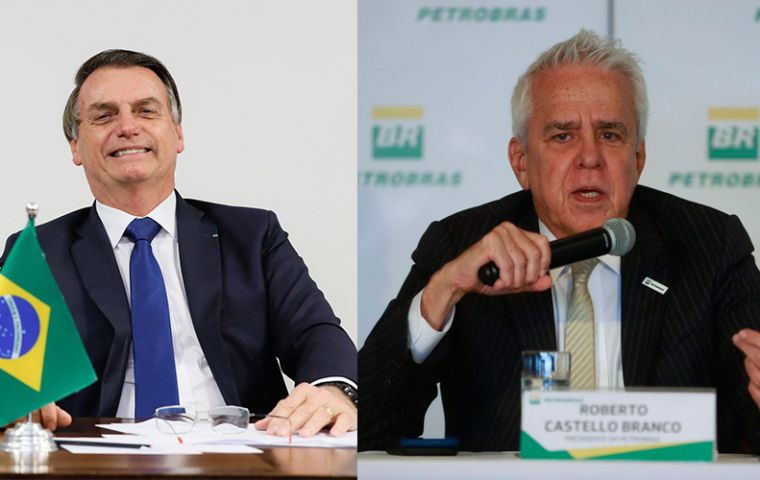MercoPress. South Atlantic News Agency
Fuel prices dispute, Petrobras CEO removal trigger fears of economic populism
 The leadership change at Petrobras followed a feud with Bolsonaro over fuel prices after Petrobras adjusted them to align with international rates
The leadership change at Petrobras followed a feud with Bolsonaro over fuel prices after Petrobras adjusted them to align with international rates More changes are in the pipeline, announced Brazilian president Jair Bolsonaro, after replacing the CEO of the country's oil and gas giant Petrobras with a former general. The move had an immediate impact in markets given the confidence investors had in the removed University of Chicago educated economist, Roberto Castello Branco.
The leadership change at Petrobras followed a feud with Bolsonaro over fuel prices after Petrobras adjusted them to align with international rates. His abrupt move on Saturday may add to concerns about a wider shift away from market-friendly policy goals by the administration.
“I have to govern, change parts that may not be working, and if the media is concerned about yesterday’s change, next week we’ll have more,” Bolsonaro said at an event on Sunday.
Rising oil prices have been a mixed blessing for Petrobras historically because it has come under pressure from both business and labor friendly administrations to suppress fuel costs.
Truckers, who brought the economy to a halt during a strike in 2018 and are part of Bolsonaro’s political base, have been complaining about rising diesel prices and threatening to strike, prompting the president to publicly criticize what he called excessive increases.
Bolsonaro, who has a military background, announced the appointment of Joaquim Silva e Luna late on Friday on his Facebook page to replace Roberto Castello Branco. Branco, who had been on the job since the Brazilian president took office in January 2019, won praise from investors for reducing debt and steering Petrobras through the pandemic, and had been an advocate of independence from government intervention.
“The president has chosen economic populism,” said Sergio Goldenstein, a former central bank director who’s now a consultant at OHMResearch. “Positions against fiscal equilibrium, favoring of certain groups and, now, aggressively interfering at a publicly traded, state-run company. The recent signals are really bad.”
Petrobras said it was notified by the energy ministry of the government’s decision to replace Branco, according to a statement on Friday.
Silva e Luna, who will need the approval of Petrobras’s board to take over, is the first military officer to take the helm of the oil producer since the 1980s. The government controls a majority of Petrobras voting shares and names six of the 11 board members.
A company has to look at social issues, Silva e Luna said to Valor newspaper when he was asked about truck drivers’ complaints about diesel prices. Fuel costs, as well as currency and oil appreciation, have a social impact, and these factors need to be analyzed with the board, he argued
Silva e Luna is a former defense minister and has been in charge of the Itaipu hydroelectric dam for two years. He joins two other members of the military now overseeing the oil industry. The energy ministry and the national oil regulator, known as the ANP, are both run by admirals.
Branco made progress on long-standing plans to sell off refineries and open the domestic fuel market to more competition, and market-based pricing is a key element for potential buyers. Rio de Janeiro-based Petrobras lost billions of dollars during bull markets for oil when previous administrations pressured it to suppress domestic prices.
Petrobras lost about US$ 4.5bn in market capital on Friday after Bolsonaro complained about excessive price increases and said changes were coming. American depositary receipts fell almost 10% in after-hours trading in New York after the announcement of the CEO change.
“We will never interfere in this great company nor in its pricing policy, but the population doesn’t want to be surprised by price increases,” Bolsonaro said, adding that Petrobras can increase prices as long as there’s “predictability” and “transparency”.
Branco is a close ally of economy minister Paulo Guedes, a champion of free markets who is looking to reduce the role of the state in Brazil’s economy. Branco‘s departure signals these views may be coming out of favor with Bolsonaro.




Top Comments
Disclaimer & comment rulesCommenting for this story is now closed.
If you have a Facebook account, become a fan and comment on our Facebook Page!